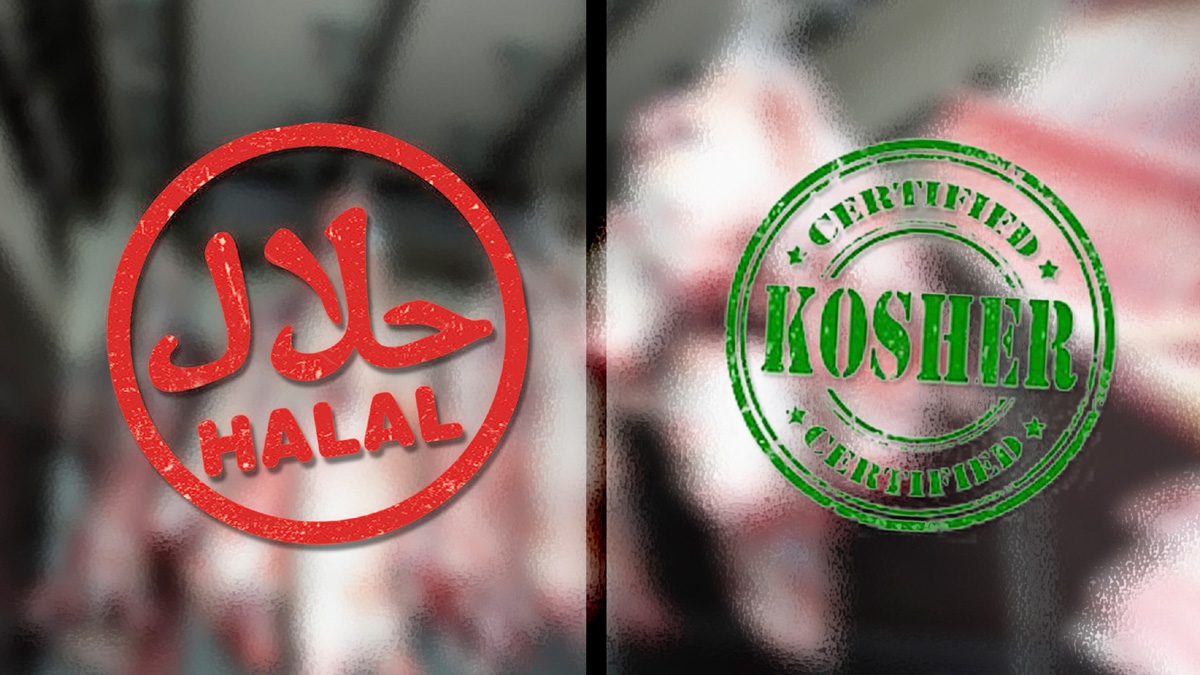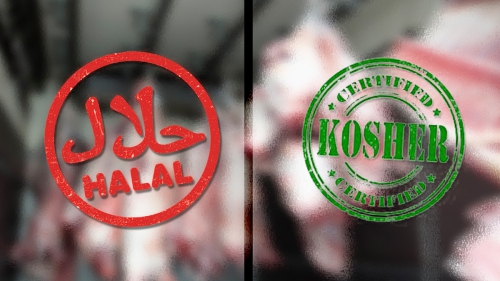Halal, Kosher and Religious Understanding

What can the differences and the similarities between the laws of Halal and Kashrut teach us about Islam and Judaism?
There are three ways to compare different religions. One way is the Medieval polemical style: ‘my way is true and any differences between my way and other ways is due to the other ways being wrong/false, deviant (sectarian heresies) or due to their distortions and misunderstandings.’
Al-Biruni (973-1048) is a remarkable exception. In Biruni’s well known book on the Hindu religion (with its numerous statues of numerous Gods) he states, “This book is not a polemical one. I shall not produce the arguments of our antagonists (just) in order to refute them… I shall place before the reader the theories of the Hindus exactly as they are.”
The second way is the modern academic way that treats all religions as equally the solely the result of human perceptions, ideas and experiences. No religion can be true, except to its believers, because all of them are solely the creation of human beings. This was the firm belief of the well known Islamic scholar I first studied with in 1960 at UCLA; G. E. Von Grunebaum.
The third way, is the least practiced way, because it requires that religious scholars have both a firm commitment to their own religion; and then use their own religious commitments and experiences to help them understand the religious experiences and truths in other religions.
This requires the ability to harmonize differences by seeing them in the larger context of Allah's statement in the Qur'an: “To each of you We prescribed a law and a method. Had Allah willed, He would have made you one nation [united in religion], but [He intended] to test you in what He has given you; so race to [all that is] good. To Allah you all return together, and He will [then] inform you concerning that over which you used to differ.” (5:48)
All monotheistic religions should be able to harmonize their philosophical differences of principle with each other because they all come from the same one source of religious inspiration. As a Hadith narrated Abu Huraira reports: Allah's Apostle said, "The prophets are paternal brothers; their mothers are different, but their religion is one." (Bukhari) So all prophets of monotheism have one father; Allah: but they have different mothers; mother tongues, motherlands, etc.
There is no need then for the prophets to try to conform or harmonize the ritual or legal practices they teach their own communities because these are what makes each national or tribal community an unique religious community: “Ritual prayer differs in every religion, but belief never changes.” (Rumi Fihi Mafih 49)
Thus, Jews and Christians can be Muslim Prophets because they, and their loyal followers, all have the same basic muslim (monotheistic) beliefs; but members of the Muslim community can be Muslims only if they both believe and practice the Muslim way, because that is what makes their own religious community unique. This is also true for Jews.
That is why I think of myself as a Reform Rabbi who is a muslim (believing monotheistic) Jew. Actually I am a muslim Jew i.e. a faithful Jew submitting to the will of the one and only God, because I am a Reform Rabbi.
As a Rabbi I am faithful to the covenant the one God made with Abraham – the first muslim Jew, and I submit to the covenant and its commandments that God made with the people of Israel at Mount Sinai.
As a Reform Rabbi I believe that Jewish spiritual leaders should modify Jewish tradition as social and historical circumstances change and develop. I also believe we should not make religion difficult for people to practice by adding an increasing number of restrictions to the commandments we received at Mount Sinai.
These are lessons that prophet Muhammad taught 12 centuries before the rise of Reform Judaism in the early 19th century Germany. Although most Jews today are no longer Orthodox, if the Jews of Muhammad's time, had followed these teachings of prophet Muhammad, Reform Judaism would have started 1,400 years ago.
I believe that Muhammad was a prophet of Reform Judaism to the Orthodox Jews of his day; although he was 1,200 years ahead of his time. During the six centuries between the birth of Jesus and the arrival of Muhammad in Yathrib, the city of Jews (Medina), almost all Jews had became Orthodox Jews.
After the destruction of Jerusalem in the year 70 CE, the percentage of Jews living as a minority throughout the middle east, and in countries around the Mediterranean Sea, steadily rose higher and higher. In reaction to the danger of assimilation into the polytheistic majority, Orthodox Rabbis added many extra prohibitions to Jewish law to keep Jews separate from all idol worshipping, polytheistic pagans. Thus, most Jews became increasingly strict in the observance of the laws of Kashrut (dietary restrictions).
Orthodox Rabbis did not follow the example of Muhammad as narrated by his wife Aisha: “Whenever Allah's Apostle was given the choice of one of two matters, he would choose the easier of the two, as long as it was not sinful to do so, but if it was sinful to do so, he would not approach it. Aisha also said: “Whenever Allah's Apostle ordered the Muslims to do something, he used to order them to do deeds which were easy for them to do.” (Bukhari)
Although the Torah of Moses prohibits adding to the commandments (Deuteronomy 4:2 and 13:1) over the centuries Orthodox Rabbis added many restrictions to the laws of prohibited activities under the theory of building a protective fence around the Torah's laws.
Also, whenever Orthodox Rabbis were in doubt if an animal had been slaughtered correctly according to Jewish law, or if one could eat a newly discovered species of bird, Orthodox Rabbis ruled it prohibited. They were not guided by Muhammad's principle as narrated by Sa'd bin Abi Waqqas: The Prophet said, "The most sinful person among the Muslims is the one who asked about something which had not been prohibited, but was prohibited because of his asking." (Bukhari)
Thus, if we compare Jewish and Muslim laws about daily food consumption we will find they are very similar in basic principles to each other, with the Orthodox specific restrictions being more numerous and extensive. Of the major world religions. Christianity is the only one that has no everyday dietary restrictions. Buddhism, Hinduism, Islam, and Judaism all have a religious system of daily dietary discipline.
The general religious principle is that personal self control is best learned through overcoming the daily temptations we all have to face in satisfying our appetites and desires for food and drink. Here is a summery of the similarities and differences between Halal and Kosher.
Halal and Kosher: “Halal” in Arabic means permissible or lawful. “Kosher” in Hebrew means proper or fit to eat. Ḥalal is a general term for all that is permissible according to Islamic law. The term designates not only foods that are permissible according to Islamic law, but also all matters of daily life. Kosher foods are those that conform to the regulations of Kashrut, the Orthodox Jewish dietary law. However, many Jews also use the term un-kosher to describe unfit social, moral and ethical behavior.
Slaughtering: In both Jewish and Muslim law slaughtering must be swift and at single point on the throat; blood has to be completely drained. The basic principle is: “forbidden to you is that which dies of itself, blood, pig flesh, that on which any other name than that of Allah has been invoked, the strangled (animal), that beaten to death, that killed by a fall, that killed by being smitten with the horn, and that which wild beasts have eaten, except what you slaughter, and what is sacrificed on stone (alters) set up (for idols) and that you divide by the arrows; that is a transgression. (Qur’an 5:3 and 6:145) All of these prohibitions are found in the the Written law of Moses and the Oral law of the rabbinic tradition.
Halal requires a prayer before every slaughter. Orthodox Kashrut requires a holy intention to slaughter according to God’s commandments; but does not require a specific audible prayer before each act of slaughter. “Eat of that over which the name of Allah has been mentioned, if ye are believers in His revelations.” (6:118)
For meat to be Halal the slaughter must be a religious muslim and for meat to be Kosher the animal must be slaughtered by a religious Jew. Although the rule about the slaughter seem to be the same for both religions; it is not. The term ‘muslim’ slaughter applies also to Jewish slaughters for the Qur’an explicitly states: “The food of the People of the Book is lawful unto you and yours is lawful unto them.” (5:5)
Thus it is clear from Sura Al-Maeda that eating meat from a Christian or Jewish butcher is lawful (Halal). However for this to be lawful; the Christian or Jewish butcher must be a practicing Christian or Jew.
Now in the case of Orthodox Jews this is easy. As long as the Jew is a practicing Jew; and the meat is slaughtered in accordance with Jewish law (Torah Kashrut) then this meat and all other Kosher food is lawful (Halal) and can be eaten by Muslims.
But with Christians the main issue is that in the west Muslims are very unlikely to come across a practicing Christian who is following the teachings of Prophet Jesus, who said about the Divine commandments in the Torah of Prophet Moses; ”Whoever annuls one of the least of these commandments, and teaches others to do the same, shall be called least in the kingdom of heaven; but whoever keeps and teaches them, he shall be called great in the kingdom of heaven. For I say to you that unless your righteousness surpasses that of the scribes and Pharisees (Orthodox Jews), you will not enter the kingdom of heaven.” (Matthew 5;19-20)
Almost all Christians eat pork. It is imposable to find a Christian butcher that does not have pork in his or her shop. Most slaughter houses and meat processing plants also process Pork. Many animal by-products made from animals in the west contain Pork.
Therefore most Islamic scholars advise that Muslims should not buy meat from shops that also sell pork or pork by products. Only Kosher foods, that require strict avoidance of any contact, direct or indirect with pork products, are fit/halal/kosher for Muslims.
Thus we can see that in the modern world, where millions of Muslims live as a minority within Christian lands, two developments have occurred. One; Muslims can rely on Kosher food, but not on non-kosher food products.
Two; Orthodox Jews still cannot use Halal food, but the majority of Jews, who are no longer Orthodox, and who now have a diet that is much closer to Halal than to strict Orthodox Kashrut, can and should use Halal food.
This essay is in memory of Andy Alexander, who died August 12, 2015.

















